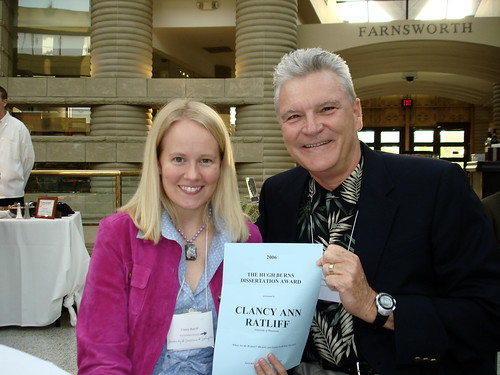Derek has chosen Karen Kopelson's "Sp(l)itting Images; or, Back to the Future of (Rhetoric and?) Composition" for our most recent rhet-comp blog seminar. I think it's a great choice, and here's the first part of my response:
Kopelson's article is a much-needed, frank discussion of the pedagogical imperative, the idea that any rhetoric and composition research project must necessarily have a "pedagogy hook," or a section about implications of the project for college composition. The pedagogical imperative, Kopelson points out, is for many a matter of ethics: our field's mission, and I use that word with all the evangelical valence it has, is to teach college students how to write. Kopelson brings up the argument that "our research is funded with student dollars," not that she agrees with it or says it's valid -- I don't think it's that simple by any means.
Kopelson's concern is that graduate students are too constrained by the pedagogical imperative and that it will overdetermine the future of the field. She also goes through a number of concerns about how the field of rhetoric and composition has gone about attempts at interdisciplinary scholarship as well as the creation and use of theory, which I'll get to in a later post.
Now, though, I need to explain how I came to the field of rhetoric and composition. I'll tell you why you should care about this a little later.
I got my B.A. having had courses in literature and linguistics. I was prepared very well in those areas, but I never took a rhetoric course. One was offered, but for whatever reason I didn't take it. When I set out to get an M.A., I wanted to study rhetoric simply because it was a gap in my knowledge. I said as much in my statement of purpose when applying to programs.
At Tennessee, my first semester in graduate school, I took a Classical Rhetoric course. It was like someone had taken me over to a big pile of wood, brick, sheetrock, and shingles and said, "okay, now build a house." That is to say, I was submerged in unfamiliar material and ways of thinking. The way I was taught composition had nothing to do with rhetoric but consisted of the modes.
Anyway, sometimes when I'm in this kind of situation, I think, eh, who needs it? But other times, I buckle down and stubbornly think, I MUST MASTER THIS. Rhetoric was one of those instances. I went on to get really into it, and you can see where that led me.
Kopelson's research is based on a survey of graduate students and professors at two universities. On pages 753-54, she writes:
When asked if they encouraged dissertating graduate students to do work that makes direct connections to pedagogy, the vast majority of our faculty respondents (over 80 percent) claimed to do so only when “appropriate”—that is, when a student’s “project calls for it by its very nature,” or when there are “clear pedagogical implications” to the work. Interestingly, however, the majority of students in our sample revealed feelings of intense pressure to create clear pedagogical implications and applications whether their projects led them in that direction or not, and, most tellingly I think, whether they experienced such pressure firsthand and directly or only as some vague sense of what is required by the field.
When I was at Minnesota doing my PhD, my professors never issued the pedagogical imperative. Still, like the students surveyed, I got the sense that I'd never succeed unless I could answer the "implications for pedagogy" question in a job interview and an article manuscript. My dissertation didn't have to do with pedagogy, but I put in a section in the conclusion about pedagogy anyway, as I wanted to align myself explicitly with composition, and I was coming out of a program that (at the time) was more known for technical communication.
“It’s not necessary,” [a faculty respondent writes], “to write five chapters about Heideggerian philosophy’s importance for broadening our conception of the rhetorical basis of epistemology only to turn to the last chapter and talk about teaching Heidegger to first-year students. I have seen people try similar moves, [and] have heard colleagues make such demands.
Like this faculty member, my committee members didn't think it was necessary, and I suspect that they felt it was a little tacked-on. But they didn't make me take it out. All this being said, I have four thoughts about the pedagogical imperative:
1. A pedagogical implications section is not necessary, but it's impressive if the researcher can explain implications for pedagogy. Along the lines of the argument that you don't really understand something unless you can explain it in clear, simple terms to a non-expert, it would really be something if the person in the Heidegger example COULD connect that research to first-year writing.
2. Not all rhet/comp people are passionate about teaching (and that's okay!). Those who are passionate about it, particularly the early leaders in the field whose cross-over from literature to composition due to love of teaching is described by Kopelson as a religious conversion narrative, have put the pedagogical imperative in place. Now you know why I explained how I came to the field. It's not that I don't enjoy teaching or don't think it's important, but I came to the field another way.
3. So much of this issue has to do with gatekeeping -- for jobs, grant funding, publications. I'd like to know this: how often does it actually occur that manuscripts are conditionally accepted pending insertion of pedagogical implications or rejected due to their absence?
4. Sometimes it takes TIME to figure out the connections of research and theory to pedagogy. A lot of time, years. Perhaps graduate students just want to be trusted to take that time.
More later on the use of theory and the terms "rhetoric" and "composition" (and new alternative terms).



